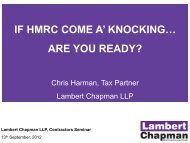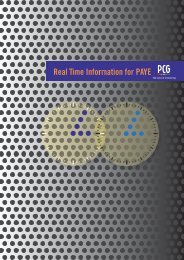Professor Anthony Glees Dr Julian Richards University of ... - PCG
Professor Anthony Glees Dr Julian Richards University of ... - PCG
Professor Anthony Glees Dr Julian Richards University of ... - PCG
- No tags were found...
You also want an ePaper? Increase the reach of your titles
YUMPU automatically turns print PDFs into web optimized ePapers that Google loves.
have exactly the expertise that government requires but does not hold, at thetime <strong>of</strong> applying, the clearance the job demands 1 . Indeed, this is a trulyfundamental issue because without a level playing field, the government cannotbe certain it is getting the experts it needs at the best price for the taxpayer.This is why the government spells out very clearly that pre-existing clearancesare not a requisite for most jobs for which vetting is required.The phrase a „Catch-22‟ situation has come into common parlance thanks to theAmerican novelist Joseph Heller who coined it in 1961. He used it to describehow a person (in this case an American Air Force pilot) was told he could notvolunteer to fly a highly dangerous mission unless he was deemed sane by hissuperiors but by volunteering for the mission he would be demonstrating tothem that he was in fact insane.In our context, the catch is that those applyingfor a post which should give them theopportunity to acquire security clearance cansometimes only gain the position if theyalready have security clearance. And thosewho do not have security clearance cannotapply for posts for which they would be able toobtain a clearance. We have seen clearevidence <strong>of</strong> this „Catch-22‟ situation affecting..the vetting processmust not be usedwrongly to excludefreelancers who mayhave exactly theexperience thatgovernment requiresbut does not holdprivate contractors seeking straightforward security clearance. Some <strong>of</strong> the bestfreelance experts in the UK are currently being denied government contractsbecause they are told they must have a pre-existing security clearance for theirapplications for government work to be considered. But, at the same time, theyare also told they can only gain a clearance once their application has beensuccessfully accepted. In these cases, no application can be successful withoutan existing security clearance; but no security clearance can be gained without asuccessful application: this is surely a „Catch-22‟ situation if ever there was one.1 Cabinet Office, ‘HMG Personnel Security Controls’. July 2010.16








